Introduction: Marketing in Transition
Modern marketing combines many different tasks and areas, it is becoming truly complex and sophisticated, and most importantly, it is undergoing a real restructuring of meanings. Such changes are necessary because old patterns are working worse and worse. However, new patterns require not so much technology as strategy and depth. We are no longer talking just about channels or content, we are talking about something deeper: about attention, trust and the ability of a brand to be understood at first glance.
That’s exactly why recruiters need to pay attention especially. As the market shifts, the profile of a strong marketer is changing too. It’s no longer enough to find someone who can run a PPC campaign or build an email funnel. Today’s top talent blends strategy, analytics, creativity, and curiosity. They don’t just know what to do - they understand why it matters.
In addition, leading marketing executives including those from BCG, Mercedes-Benz, Salesforce, and e.l.f. Beauty recently highlighted at the CMO Insider Breakfast in Cannes that most marketing leaders plan to increase their investment in AI. They believe this is necessary today, as the current climate requires a close alignment between marketing and AI technologies.
We analyzed the latest data on U.S. marketing jobs for 2025: live numbers, real trends, the hottest skills. Let’s take a look at where marketing is and where it’s going.


In detail, you will learn:
- The most popular positions in marketing in 2025 and their income
- New requirements and skills, new directions needed for development in this field
- The highest-paid roles
- Differences in income by geography
- The most in-demand skills today and certified knowledge
This report was built for those making hiring decisions in a market that’s faster, sharper, and more competitive than ever. Whether you’re a recruiter, team lead, or finance decision-maker, you’ll find clear, data-driven signals to help you spot the right talent - people who don’t just fill roles but move the brand forward.
Chapter 1: The Highest-Paid Roles in Marketing Today
As marketing becomes more complex and data-driven, salary ranges are starting to reflect not just experience, but specialization and impact. Leadership roles, strategic thinking, and technical fluency are now tied more closely to compensation than ever before. In this section, you’ll see the latest salary data for 20 key U.S. marketing jobs, learn where the biggest pay gaps are, and take a closer look at the areas where hiring is most in demand.
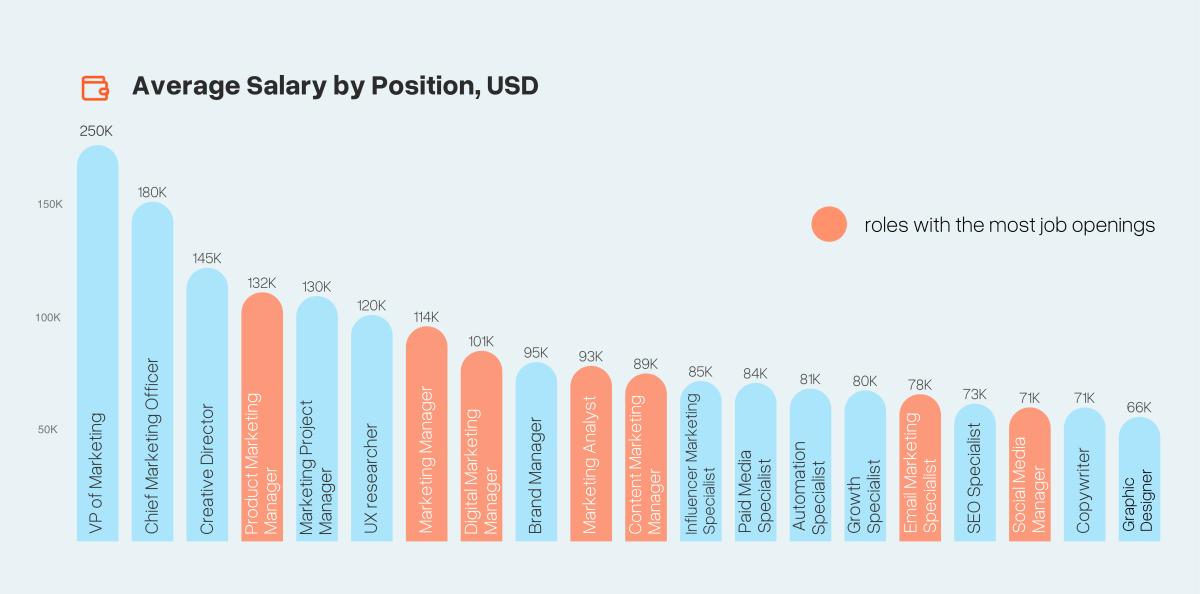
Top 20 Highest-Paid Marketing Roles
According to 2025 data, the VP of Marketing currently holds the top spot with an average salary of $250K, followed by the Chief Marketing Officer at $180K and the Creative Director at $145K. These executive roles are closely tied to brand leadership, long-term growth strategy, and team performance.
Other high-paying roles include Product Marketing Manager ($132K), Marketing Project Manager ($130K), and UX Researcher ($120K) - each reflecting the growing value placed on cross-functional coordination, user insights, and product alignment.
Even mid-level roles show strong salaries: Marketing Manager earns around $114K, Digital Marketing Manager, about $101K, and Brand Manager around $95K. These roles are typically responsible for driving key metrics, defining business results, and the success of individual projects, which explains their impressive pay range.
Where the Biggest Salary Gaps Exist
There’s a noticeable gap between leadership and specialist roles. For example, the jump from Marketing Manager ($114K) to VP of Marketing ($250K) is more than double. This suggests a sharp increase in earning potential once professionals move from tactical execution into organizational leadership.
At the lower end of the spectrum, roles like Copywriter ($71K), Graphic Designer ($66K), and Social Media Manager ($71K) reflect how content production and community engagement, while crucial, are still undervalued in many organizations compared to strategic or technical positions.
Most In-Demand Roles Today
💡 Recruiter Insight: Interestingly, some of the most in-demand roles (highlighted in orange on the chart) are not the highest-paid, but they are critical to the current hiring landscape. These include:
- Product Marketing Manager ($132K)
- Marketing Manager ($114K)
- Digital Marketing Manager ($101K)
- Marketing Analyst ($93K)
- Content Marketing Manager ($89K)
- Email Marketing Specialist ($78K)
- Social Media Manager ($71K)
These positions combine creative, analytical, and campaign-focused responsibilities - all of which are essential for companies navigating crowded digital spaces and aiming for scalable growth.
Why These Roles Are in Highest Demand
The reason these roles top today’s hiring lists is simple: they sit at the core of business growth in a digital-first world. A Product Marketing Manager connects product teams with market realities - translating features into value, which is crucial for launches and positioning. Marketing Managers and Digital Marketing Managers are execution powerhouses, often juggling cross-channel campaigns with tight performance metrics.
Content Marketing Managers fuel brand visibility through storytelling, SEO, and thought leadership, while Marketing Analysts decode the data behind every decision. Meanwhile, Email Marketing Specialists drive retention and conversion with personalized touchpoints, and Social Media Managers are the voice of the brand - listening, engaging, and reacting in real time.
All of these roles are in high demand because they deliver measurable impact across the funnel - from awareness to loyalty. In a market under pressure to perform fast, companies are doubling down on the people who can move the needle daily.
Marketing Salaries by Experience Level

When we look at marketing salaries through the lens of experience, the range becomes even more clear. Entry-level professionals (0–2 years) typically earn between $50K–$65K, while mid-level roles (3–5 years) bring in between $70K–$95K. The biggest leap happens at the senior level (6+ years), where salaries range from $100K–$145K. The average across all roles sits at $90K, with an average hourly rate of $32. For recruiters and hiring teams, this context helps clarify budget expectations and compensation conversations - especially as more candidates become acutely aware of their market value.
On average, marketing positions can be considered quite attractive for career growth. On average, it takes 5 to 7 years to grow from a Junior to a Senior position in marketing. The US marketing market is currently particularly dynamic, and the growth rate can be faster, especially in tech companies. That is, in just 6 years, a specialist's income can increase by 2 times.
Income differences by geography
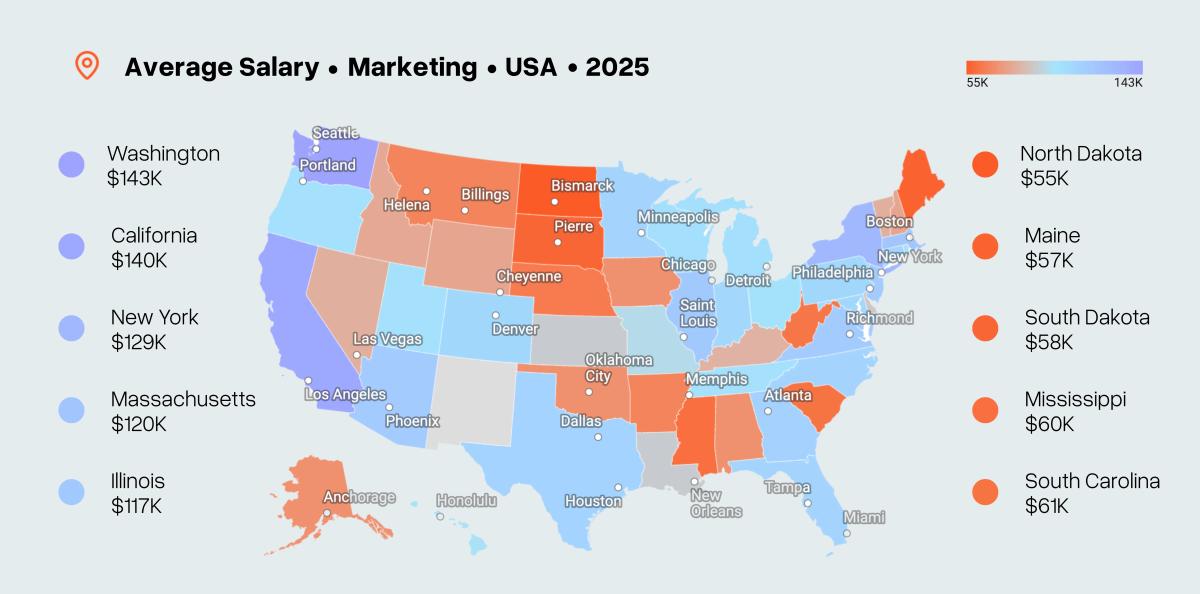
There is a fairly noticeable gap in the average salary in marketing between US states - about 2.5 times, that is:
in Washington (as the highest-paying state) - $143 K, or in California (the second highest-paying state) - $140 K, while in North Dakota - only $55 K.
Such a difference in income can be explained by a denser concentration of companies in some states. A large number of leading companies are concentrated in Washington, California and other large states, which in turn greatly affects demand and increases competition for talent in this industry.
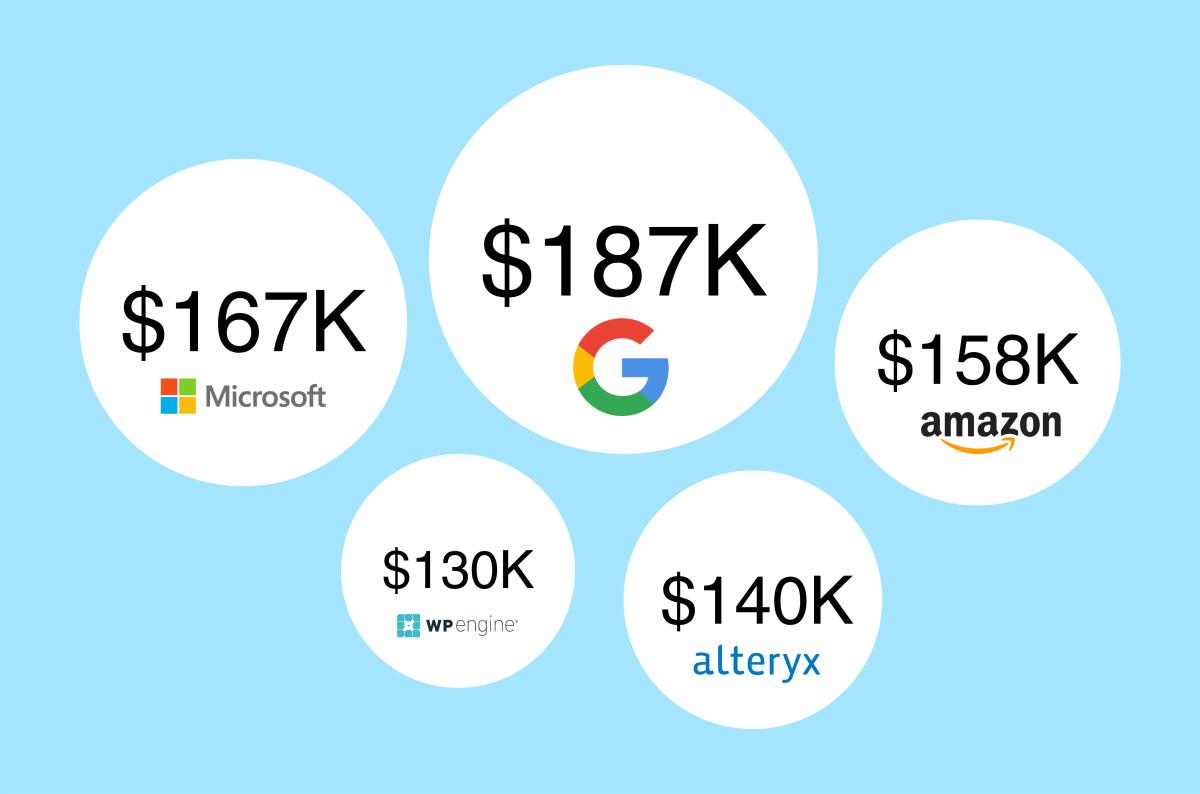
Chapter 2: The Most In-Demand Marketing Skills in 2025 and Their Impact on Compensation
The marketing landscape in 2025 is more dynamic and competitive than ever before. Driven by rapid digital transformation, changing consumer behaviour, and the rise of AI and automation, the skills marketers need to succeed have evolved significantly. This chapter highlights these skills and explores why they are so valuable. What’s more, you’ll see a comparison of emerging and classic critical skills with their actual supply in the labor market, based on the latest research.
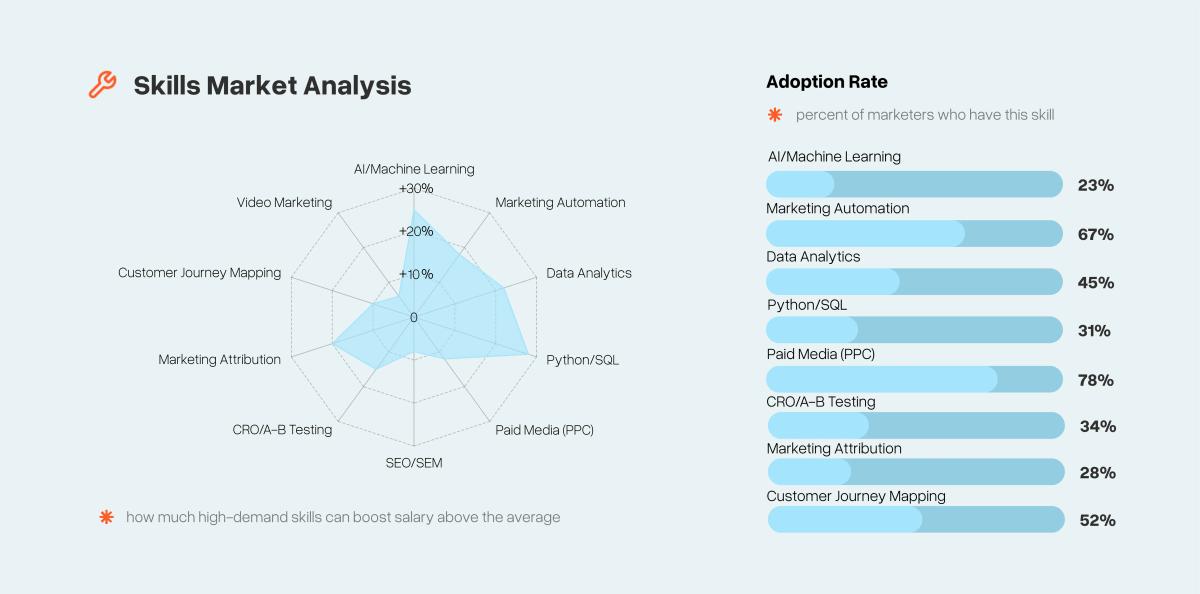
Let’s take a closer look at the 4 most influential skills.
1. Technical Skills: Python & SQL
- Income Impact: Nearly +30%
- Supply: 31%
Description:
Proficiency in Python and SQL has become a major income differentiator for marketers working in data-rich environments. These skills enable professionals to go beyond surface-level analytics - automating reporting, building predictive models, performing cohort and funnel analysis, and integrating with advanced data platforms.
Why It Matters:
In a landscape dominated by customer data and attribution modelling, Python and SQL empower marketers to extract, transform, and analyze large datasets independently, without relying on data teams. This not only accelerates insight generation but also unlocks new strategic capabilities, such as LTV forecasting and real-time personalization.
Supply vs Demand Insight:
Despite their high impact on compensation (up to +30%), only 31% of marketers report proficiency in Python and SQL. This disparity makes these skills some of the strongest drivers of salary growth in 2025 and beyond.
2. AI / Machine Learning
- Income Impact: ~25%
- Supply: 23%
Description:
Understanding how to effectively use generative AI tools to create ideas, write and analyze data, and integrate their work into your projects is becoming a major differentiator. This skill is still relatively new among professionals today, but it is rightfully one of the leading ones.
Why It Matters:
This is one of the most in-demand skills in many industries today, including marketing. AI does not replace marketers, it complements them. Those who learn to harness its power become significantly more effective and valuable.
Supply vs Demand Insight:
With only 23% of marketers currently having strong AI skills, this skill offers high income and career prospects.
3. Data Analytics
- Income Impact: ~22%
- Supply (marketers who have this skill): 45%
Description:
Already a classic skill, data literacy remains one of the most important and transformative opportunities today. Professionals with data analytics skills (using tools like Google Analytics and CRM dashboards) are able to extract insights from customer behaviour and translate them into actionable strategies.
Why It Matters:
Marketing campaigns and budgets are under intense scrutiny. Companies need evidence-based decisions, not gut feelings. Data-savvy marketers help organizations optimize budgets and build a more accurate and effective strategy, delivering measurable results.
Understanding Supply and Demand:
Data analytics is a well-established skill, making it somewhat more common than earlier skills, occurring in about 45% of cases. However, it continues to exert a consistently significant influence on income.
4. Marketing Attribution: Connecting Actions to Outcomes
- Income Impact: +20%
- Supply: 28%
Description:
Marketing attribution is the practice of identifying which touchpoints and channels contribute most to conversions and revenue. Professionals skilled in attribution modelling (single-touch, multi-touch, algorithmic) can evaluate the true ROI of each campaign and allocate budgets with hight precision.
Why It Matters:
As customer journeys become more complex and fragmented, understanding which marketing efforts are actually driving results is critical. Attribution helps eliminate redundancy, refine targeting, and justify marketing spend to stakeholders.
Supply vs Demand Insight:
Only 28% of marketers report confidence in attribution methods, even though the ability to quantify impact across channels is increasingly expected in performance-driven roles. This rarity, paired with high business value, translates into strong upward pressure on compensation for those who master this area.
💡 Recruiter Insight: Rare Skills, High Stakes
While demand for advanced marketing skills such as data analysis, Python, marketing attribution, and AI tools is rapidly increasing, the current supply of professionals who truly master these areas remains relatively low - often below 30%. This creates a noticeable talent gap in the industry. For recruiters and hiring managers, identifying a marketer who combines strategic thinking with technical expertise is not just a competitive advantage - it's a rare find. In today’s market, hiring such a specialist is not only a win, but potentially a multiplier for business performance.
Chapter 3: The Expanding Role of AI in Marketing and the Rise of New AI-Driven Roles
2024–2025 marks a turning point in the evolution of marketing. AI is no longer just a supporting tool – it has become a central driver of strategy, execution, and innovation. From content generation to predictive analytics, AI is changing the way marketing is done. Along with this shift, we are seeing the rise of entirely new roles within marketing teams – roles specifically built around the capabilities of AI.
AI as a Growth Engine in Modern Marketing
Today, AI is integrated across nearly every domain of marketing:
- Automating repetitive tasks (chatbots, email campaigns, media planning)
- Generating content (text, images, and even video)
- Real-time personalization of customer journeys
- Predictive analytics and trend forecasting
- Always-on optimization and A/B testing
Organizations that embrace AI are gaining clear advantages: faster time to market, lower production costs, and significantly improved performance metrics. In a highly competitive and cost-conscious market, this efficiency edge is becoming a business necessity.
AI Literacy Is Now a Core Competency
Despite AI’s rapid adoption, many marketing professionals remain underprepared. Mastery of tools like ChatGPT, Midjourney, Jasper, Copy.ai, Runway, and others is becoming a baseline expectation - not just for performance marketers but also for creatives, analysts, and brand managers.
Upskilling is now urgent. Companies are investing in training programs for prompt engineering, no-code/automation workflows, and AI-powered analytics. Those who fail to adapt may soon find themselves left behind in a market that increasingly rewards AI fluency.
New AI-Driven Roles Are Reshaping Marketing Teams
According to the chart “Emerging AI Roles in Marketing,” 2025 is witnessing the rise of clearly defined AI-specialized roles. These are no longer niche - they’re becoming mainstream.
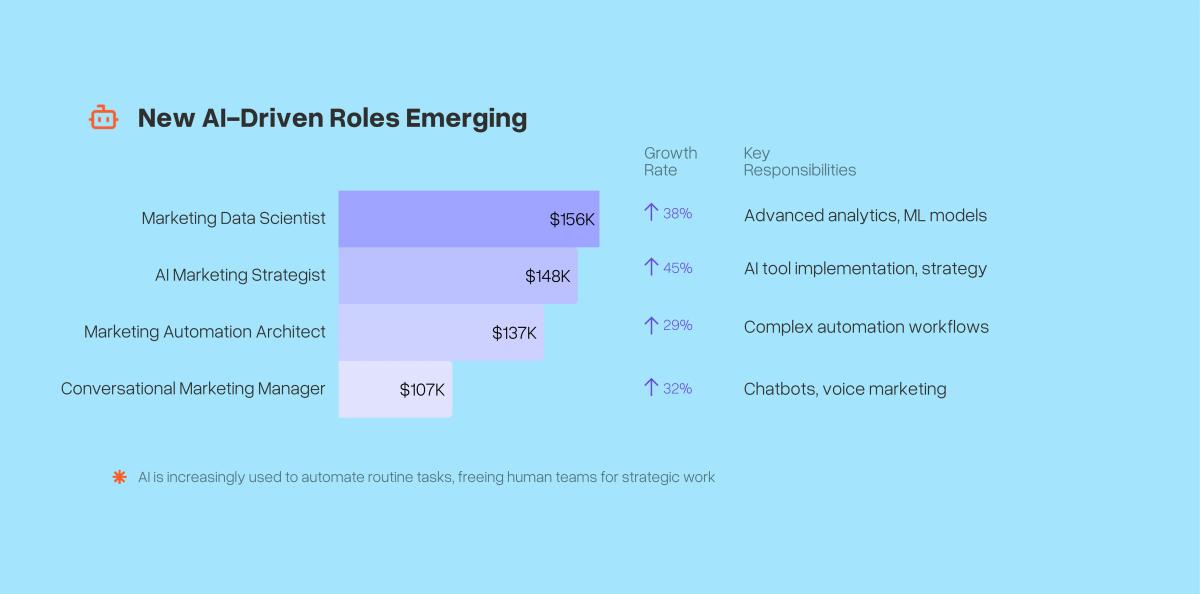
Moreover, as we can see, the average salaries of the new roles are quite competitive with even the highest paid traditional positions.
Marketing Data Scientist ($156K), responsible for advanced analytics and building machine learning models, and AI Marketing Strategist ($148K), who focuses on implementing AI tools and strategic planning, for example, - "catching up" with the top three highest paid roles.
Also in demand are Marketing Automation Architect ($137K, 29% growth), managing complex automated workflows, and Conversational Marketing Manager ($107K, 32% growth), specializing in chatbots and voice marketing.
Why It Matters Now
- The talent landscape is shifting: Traditional marketing roles now require AI proficiency as a standard.
- Efficiency becomes exponential: AI-specialized marketers can accelerate time-to-results by orders of magnitude.
- Income impact is significant: AI-competent marketers command 30–50% higher salaries on average.
- Career advancement accelerates: AI fluency opens the door to strategic and leadership roles that didn’t exist before.
💡 Recruiter Insight: The AI-Native Marketing Team
The emergence of these new AI-native roles signals a fundamental transformation: marketing teams are no longer just digital - they are becoming AI-driven at the core. This reshaping is not theoretical, it’s already underway.
For marketers, this means rethinking their career development around AI fluency. For companies, it means rethinking hiring plans, team structure, and internal training. And for recruiters, it means that finding a qualified AI Marketing Specialist or Prompt Engineer might just be the most valuable hire of the year.
🏆 Bonus finding: Certifications That Boost Salaries the Most
As an added layer to our research, we analyzed which professional certifications correlate most strongly with salary growth for marketers in 2025. The results revealed a clear trend: certifications focused on analytics, data-driven decision making, and mastery of emerging tools bring the highest income upside.
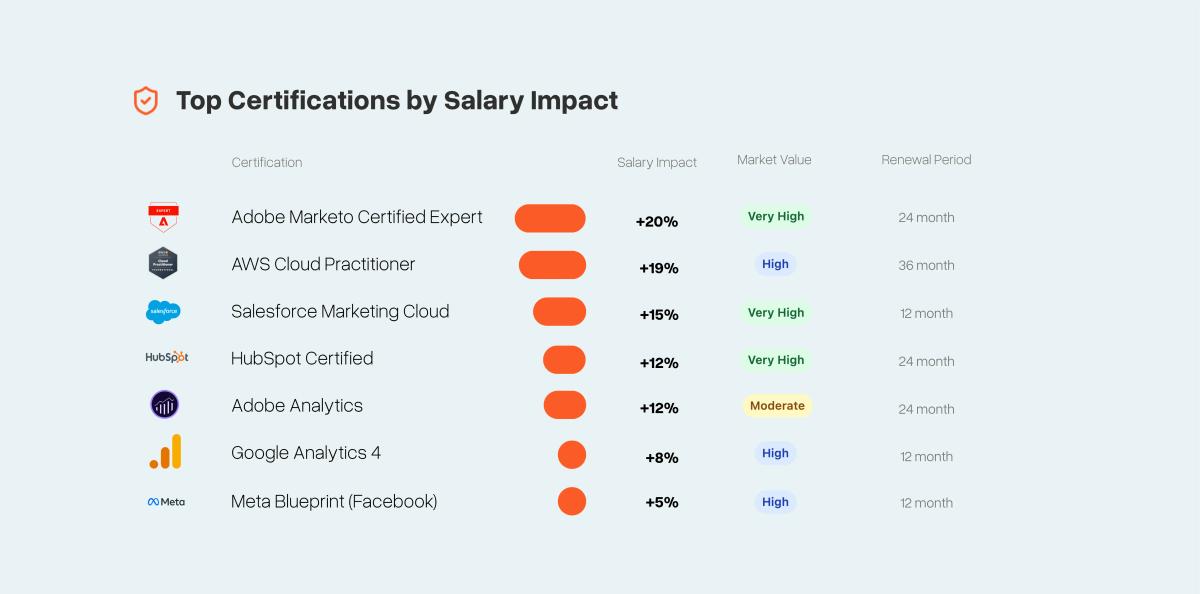
Top-Performing Certifications
Marketers who hold credentials such as:
- Adobe Marketo Certified Expert
- AWS Cloud Practitioner
- Salesforce Marketing Cloud
typically earn at least 15% more than peers in equivalent positions without formal training.
- HubSpot Certification
- Adobe Analytics
- Google Analytics 4
- Meta Blueprint (Facebook)
claim an income increase of 5% to 12%.
💡 Recruiter Insight: Strategic Takeaway
In a market where toolsets evolve monthly, certifications are becoming the fastest visible indicator of a candidate’s relevance and readiness. Recruiters who treat them as strategic filters - not just line items - will have a significant edge in sourcing top performers.
Key Takeaways: The New Rules of Marketing Talent in 2025
1. Marketing is changing fast
Old methods aren’t enough anymore. Brands need to win trust, hold attention, and be clear at first glance. Strategy and depth matter more than just pushing content or channels.
2. Hybrid and AI skills are in demand
Top marketers now mix creativity, strategy, data, and AI fluency. Roles requiring Python, SQL, analytics, and AI command higher pay - but there’s a big talent gap.
3. New AI-powered roles are emerging
AI is central now, not just a tool. Companies want specialists in automation, data science, and AI strategy - these roles are growing fast and paying well.
4. Certifications and flexibility give hiring advantages
Credentials in analytics and marketing tools boost salaries and speed hiring.
5. Salaries reflect skills and relevance
Salaries today are not only dependent on length of service - they are also strongly determined by the presence of in-demand, hard-to-find skills, the most relevant knowledge, certifications and the ability to manage a team
P.S. Don't forget to download the full report.
Further reading. GLOZO's other industry reports:
- Critical factors shaping IT Recruitment in 2025
- Key trends shaping finance hiring and salaries in 2025
- 2025 Banking recruitment and salary trends
